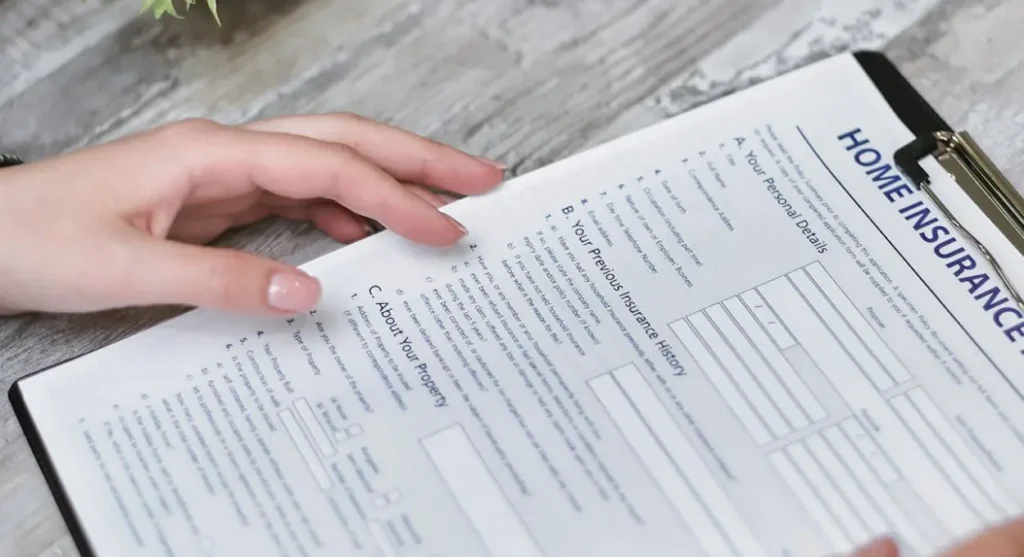Renters insurance is a financial safety net that many renters overlook, often because of misconceptions like, “My landlord’s insurance provides coverage for me.” Spoiler alert: It doesn’t.
In this guide, we’ll break down everything you need to know about renters insurance, from what it covers to how to choose the right policy. Whether you’re a first-time renter or a seasoned tenant, this step-by-step guide will help you stay protected.
This article covers the following points:
What Does Renters Insurance Cover?
Renters insurance protects you from financial losses due to unexpected events. Here’s what it typically covers:
1. Personal Property
- Your belongings, such as furniture, electronics, and clothing, are covered against risks like theft, fire, and water damage.
- Example: If your laptop is stolen, your policy can help cover the replacement cost.
2. Liability Coverage
- If someone is injured in your rental unit or if you accidentally damage someone else’s property, liability coverage can protect you from costly lawsuits.
- Example: A guest slips and falls in your apartment, and you’re held responsible for their medical bills.
3. Additional Living Expenses (ALE)
- If your rental becomes uninhabitable due to a covered event, ALE covers temporary housing and related costs.
- Example: A fire damages your apartment, and you need to stay in a hotel while repairs are made.

Renters insurance protects tenants, covering personal belongings, liability, and temporary housing expenses. However, not all risks are covered—in the next section, we’ll explore what renters insurance doesn’t cover and how to fill any gaps.
How to Choose the Right Policy
Choosing the right renters insurance policy doesn’t have to be overwhelming. Follow these steps to find the best coverage for your needs:
1. Assess Your Needs
- Take an inventory of your belongings and estimate their total value. This will help you determine how much coverage you need.
- Tip: Use a home inventory app to make this process easier.
2. Compare Coverage Options
- Actual Cash Value (ACV): Pays the current value of your belongings, accounting for depreciation.
- Replacement Cost: Pays to replace your belongings with new items of similar kind and quality.
- Which is Better?: Replacement cost coverage is more comprehensive but may come with higher premiums.
3. Understand Deductibles and Premiums
- The deductible is paid out of pocket before your insurance kicks in. A higher deductible usually means lower premiums, but make sure you can afford it in case of a claim.
- Example: A 500-deductible means you pay the first 500 of a claim, and your insurance covers the rest.
Tips for Saving on Renters Insurance
Renters insurance is already affordable (often less than $20 a month), but here’s how to save even more:
1. Bundle with Other Policies to Save on Renters Insurance
One effective way to lower your renters insurance costs is by bundling it with other types of coverage, such as auto or life insurance. Many insurance companies offer discounts when you have multiple policies, which can significantly reduce your overall premiums. For example, if you combine your renters insurance with your auto insurance, you could save anywhere from 5% to 25% on both policies.
This strategy not only makes managing your insurance easier but also ensures you have comprehensive coverage from a single provider. However, before you decide to bundle, it’s a good idea to compare quotes from different insurers to make sure you’re getting the best deal while still having enough coverage.
2. Increase Your Deductible to Lower Your Premiums
Looking to save some cash on your renters insurance? One smart move is to increase your deductible. This is the amount you’ll need to pay out of pocket before your insurance kicks in. Usually, deductibles can range anywhere from $250 to over $1,000. By opting for a higher deductible, you’re taking on a bit more financial responsibility when it comes time to make a claim, but the trade-off is that you’ll see a nice drop in your monthly or annual premiums.
Just be sure you’ve got enough savings set aside to cover that deductible if you ever need to file a claim. This strategy works especially well for renters who have a good financial cushion and don’t expect to make claims too often.
3. Look for Discounts to Lower Your Renters Insurance Cost
Many insurance companies have some great discounts that can really help you cut down on your renters insurance costs. You might find things like claims-free discounts for those who haven’t made any claims or discounts for having a security system with burglar alarms or smoke detectors.
There are also perks for going paperless or setting up autopay. Plus, some insurers offer loyalty discounts for long-time customers or multi-policy discounts if you bundle your renters insurance with auto or life insurance. To get the most bang for your buck, be sure to ask your insurer about all the discounts they offer and shop around to compare different providers. This way, you can snag the best deal without skimping on coverage.

Key Differences Between Renters and Homeowners Insurance
While renters insurance and homeowners insurance share similarities, they serve different purposes:
| Feature | Renters Insurance | Homeowners Insurance |
|---|---|---|
| Covers Personal Belongings | Yes | Yes |
| Covers the Building Structure | No (Landlord’s policy covers it) | Yes |
| Liability Protection | Yes | Yes |
| Covers Temporary Housing | Yes (if the home is uninhabitable) | Yes (if home is uninhabitable) |
| Required by Law | No, but often required by landlords | Yes (if the rental is uninhabitable) |
Common Mistakes to Avoid
Even with the best intentions, renters often make mistakes when buying renters insurance. Here’s what to watch out for:
1. Underinsuring Your Belongings
- Don’t underestimate the value of your possessions. If you underinsure, you may not have enough coverage to replace everything in case of a loss.
2. Failing to Update Your Policy
- Life changes, like buying expensive electronics or moving to a new rental, can affect your coverage needs. Review and update your policy regularly.
3. Not Reading the Fine Print
- Understand what’s covered—and what’s not. For example, most policies don’t cover damage from floods or earthquakes. You may need additional coverage for these risks.
Common Exclusions in Renters Insurance
Most standard renters insurance policies exclude the following:
- Flood Damage – Water damage from natural floods is not covered (a separate flood insurance policy is required).
- Earthquakes & Sinkholes – Damage from earthquakes, landslides, or sinkholes requires specialized earthquake insurance.
- Your Car & Auto-Related Losses – Renters insurance does not cover vehicle damage (auto insurance covers this).
- High-Value Items – Jewelry, collectibles, and expensive electronics may have coverage limits unless you add extra protection.
- Certain Dog Breeds & Liability Claims – Some policies exclude liability for injuries caused by specific dog breeds.
- Business Equipment & Home-Based Business Losses – If you work from home, business-related losses may not be covered unless you have business insurance.
Example: If an earthquake damages your rental unit, your renters insurance won’t cover your belongings—unless you purchase a separate earthquake policy.
Special Considerations for Renters
Not all rental situations are the same. You may have unique insurance needs if you’re a student, short-term renter, or living with roommates. Understanding how renters insurance applies in these cases can help ensure you’re properly covered.
1. Renters Insurance for Students and Short-Term Rentals
College students and short-term renters (e.g., Airbnb, month-to-month leases) often assume they don’t need renters insurance, which can be costly.
Do Students Need Renters Insurance?
- If you live in a dorm, your parents’ homeowners insurance may extend coverage—but limits often apply.
- If you rent an off-campus apartment, you likely need your own renters insurance policy.
- Many landlords require renters insurance as part of the lease agreement.
What About Short-Term Rentals?
- If you’re renting for only a few months, look for month-to-month renters insurance policies.
- If you list your rental on Airbnb or Vrbo, your renters’ insurance may not cover damages caused by guests—you may need host liability coverage.
Tip: If you’re a student, check with your parents’ homeowners insurance provider to see if you’re already covered under their policy before purchasing renters insurance.
Many college students assume they don’t need renters insurance, but their belongings may not be covered under their parents’ policy. To understand whether you need coverage while living in a dorm or off-campus, check out the NAIC’s guide on renters insurance for college students.
2. Coverage for Roommates and Shared Living Spaces
Many renters share apartments to save money, but standard renters insurance policies don’t automatically cover roommates.
Important Facts About Roommates and Renters Insurance:
- Your policy only covers your belongings—not your roommate’s.
- Some insurers allow roommates to be added to a policy, which is not always recommended since claim payouts are shared.
- If your roommate damages property or causes an accident, your policy may not cover their liability.
- Best Options for Roommates:
- Each roommate should get their own renters insurance policy to avoid coverage disputes.
- If you decide to share a policy, ensure both names are listed and set clear agreements on handling claims.
- Consider liability coverage for shared areas like the kitchen and living room.
Example: If your roommate accidentally starts a kitchen fire, your renter’s insurance may not cover their liability unless they are listed in your policy.
Common Misconceptions About Renters Insurance
Many tenants overlook renters insurance due to misunderstandings about what it covers. Some of the most common misconceptions include:
“My landlord’s insurance covers my belongings.” – Landlord insurance only protects the building, not your personal possessions inside the rental.
“Renters insurance is too expensive.” – Most policies cost as little as $15 to $30 per month, making it one of the most affordable types of insurance.
“I don’t own enough valuables to need coverage.” – Replacing even basic household items like furniture, electronics, and clothing can quickly add up.
“My roommate’s policy covers me.” – Unless your name is explicitly listed on their policy, their renter’s insurance does not cover your belongings.
By understanding the importance of renters insurance and debunking these common myths, tenants can make informed decisions and protect their financial well-being.
Conclusion
Renters insurance is a small investment that can save you from significant financial losses. By understanding what it covers, choosing the right policy, and avoiding common mistakes, you can confidently protect your belongings and finances.
For a broader overview of essential coverage types, see Insurance Essentials: The Best Coverage for Every Need.
Call to Action: Don’t wait until it’s too late! Get a free quote for renters insurance today and take the first step toward financial security.

